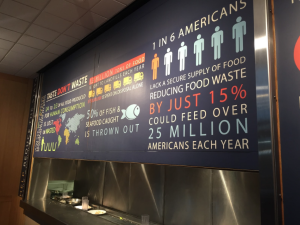-Miranda Gilgore ’18
Several pounds of food versus maybe a piece of lettuce or some green beans, if anything at all; it’s amazing what a difference age, awareness, and a bit of competitive motivation can make.
The ‘Ort Report’ is one of the most beloved traditions at the camp I worked at this summer. If you’re unfamiliar with the term ‘ort,’ it is essentially the food that a person puts on their plate, but then ends up not eating.

Food statistics displayed at Frank Dining Hall
At camp, we hold sustainability as one of our core values and one of the ways we embody this is by having the Ort Report at the end of every meal – weighing and reporting the amount of ort with the goal of reducing it as the week progresses. As could probably be expected, our youngest campers ages 8-10, tend to have a lot of ort, several pounds among the 70 or so of them. Yet, through education (and some friendly competition) by the time these campers grow up, the now 120 high schoolers meet any ort at the end of a meal with groans of frustration.
As the signs at Frank Dining hall tell us, 40% of the food produced in the U.S. is not eaten. The USDA expands upon this statistic estimating that the United States generates approximately 133 billion pounds of food waste each year. That is equivalent to over one pound of food waste per person each day or 47 pounds of ort for one meal at camp. Of course, a portion of this food waste is beyond one’s immediate control; for example, food lost during the shipping process or food that has gone bad before a restaurant can serve it. Yet, there is a lot that we as individuals do have control over.
Here are just a few tips to get you started:
If you’re eating on campus…
- Take only what you know you will eat. If you don’t know if you’ll like something, try a small portion first.
- Remember you can always go up for seconds if you’re still hungry. You don’t need to take one of everything right off the bat. Start with what you know you can finish and go back for more if you are still hungry.
- Eat all of what you take. In a way, by putting something on your plate you are making a commitment to eat it.
- At the Coop, take home what you don’t finish right away and eat it later in one of the reusable ‘gate-to-go containers.
- Look for the Project Clean Plate signs at Frank Dining Hall to take a look into Frank’s “Ort Report.”
If you’re eating off campus
- Meal plan to make sure you are not shopping for ingredients that will go unused.
- Keep track of the food you have. If it is something perishable, be mindful of expiration dates and prioritize eating the most perishable food first.
- Freeze what you know you won’t finish right away.
- Use the food you have already before buying too much more – it’s amazing how resourceful you can be when you only have a few ingredients!
For everyone:
- Remember, wasted food = wasted money. Whether that be your own, the university’s or all of the money and resources that went into bringing the food to your table. As with most environmental problems, we can’t solve the problem of food waste individually, but we can all take steps to reduce our own food waste and encourage others around us to do the same.

